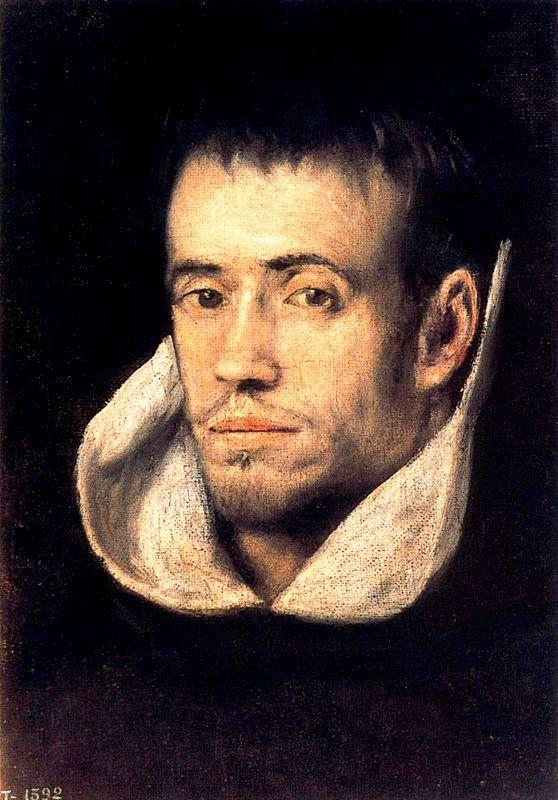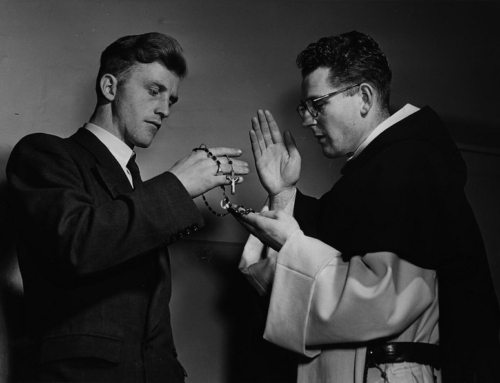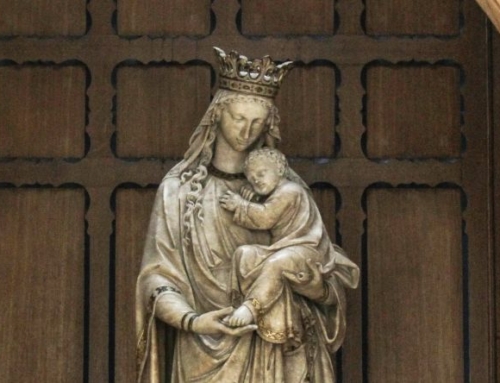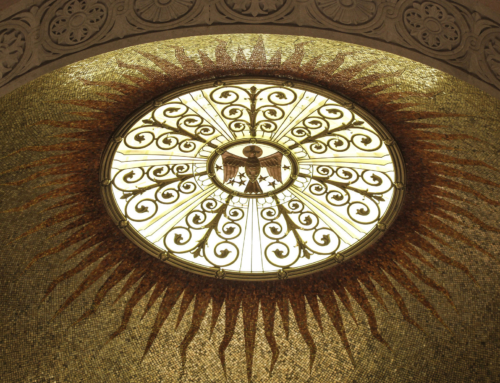Buona sera, signore, are you feeling okay?” The interrogator tried to console Padre Speranza as he awoke. “Those tranquilizers can make one quite ill. You’ll be fine in a moment. . . . Officer, get him an espresso please.” The arresting officer was offended. “But Eccellenza, with all due respect I am not a page boy!” “Officer,” said the interrogator, “go.” The policeman fetched the espresso, spat in it, and came back to give it to the priest. “Thank you officer,” the interrogator said, “you are finished for the night. Grazie.” The officer began to sputter in protest. The interrogator raised his voice and repeated, “Grazie!” The officer left the room in a huff, and Padre Speranza was now alone with Inspector Paolo Caecuzzo, the chief interrogator of the Roman province of the pan-European government.
“Signore, how are you? I am sorry that interrogations always have to be so cold and formal, especially for a gentleman like yourself.” Padre Speranza sat in silence, and drank his espresso. “Anyway, our surveillance program has been tracking you for a while, but this accursed bureaucracy we are a part of sometimes makes things so difficult. I should watch my tongue, but I can get frustrated by the system too, you see. Our records indicate that you are the last known member of the prohibited group ‘Order of Preachers.’ Now if you pardon me, I have no personal hatred of the Papal Control Organization—oh, well, sorry, the Roman Catholic Church I suppose you say—I slipped into government-speak there. At any rate, I have no particular hatred for your organization, I confess I am mostly ignorant of your system and your ways. However, you are aware of the ‘Liberation of PCO Prisoners Act’ of Standard Year 298, are you not?”
Padre Speranza replied somberly, “Certamente . . .”
“Yes, and you are aware that the ‘Order of Preachers’ is among the several organizations that are explicitly denounced in that act, for violation of the ‘Guarantee of Self-Determination and Personal Fulfillment Decree Decision’ by the High Court of Justice of Standard Year 298 as well, are you not?”
“I am.”
“And Officer Puzo wrote in his report that you were initially arrested outside of a church on the Aventine hill, for wearing religious garb. And this is not your first arrest, correct?”
“Correct.”
“And unfortunately for you, you attempted to escape by running down to the Tiber River and then swimming to the Tiber Island. It is never advisable to jump in that filthy stream! But in seriousness, resisting arrest is a capital crime. But I don’t think we’ll have to get to that point, right?”
Padre Speranza was silent.
“Anyway, you are also aware that 3,413 men and women who were associated with your group have been Suppressed since the promulgation of the act three years ago.” The friar nodded. “And you are also aware of the several hundred members of your group who accepted the Governor’s generous offer of state-funded rehabilitation to help them be reacquainted with the joys of self-determination and personal fulfillment, and are now living lives of prosperity and productivity throughout our province, contributing to the common good?”
“No!” Padre Speranza slammed the table. “You may not use that phrase!”
The interrogator looked surprised, “That phrase? What do you mean?”
“Your government knows little about self-determination and personal fulfillment, but I assure you, it knows nothing about the common good. Instead of trying to foster a society ordered towards the good God for the benefit of all men, you have attempted to replace the Creator with a system, scripture and art with forms and documents, saints and angels with bureaucrats and functionaries, in order to control people’s lives while surrounding them with an illusion of freedom. Yet you sinisterly remove their legitimate freedoms one by one so that they hardly notice their absence. No one new act or decree is ever drastic enough to cause a revolt, but each thread is pulled out carefully and slowly to minimize large-scale damage, and reactionaries are isolated and dealt with swiftly.”
Inspector General Caecuzzo was caught off-guard by the first reply. “But signore, we certainly do have the common good in mind! Why, just look at this Peace Center! On this site used to be a prison that did nothing but house criminals, who sat rotting, growing more and more bitter. Today, it is a university that reforms those who have damaged the common good by their actions, often because of poverty and ignorance.”
“In veritá, Inspector,” Speranza retorted, “you brainwash the brighter ones, and threaten them with capital punishment and force them to act as cogs in some department as gatherers of statistics and data miners. The weak ones are put to more menial tasks, the ill are euthanized, the mentally retarded are cremated— out of sight, out of mind. But the greatest offenders are those who do not conform intellectually to your theory of human utility and centralized secular control. These, because of their intelligence and charisma, you must discredit and, ideally, convert to the official state way of thinking.”
The usually reserved Padre Speranza had to pause and catch his breath. After a brief pause, though, he stood up from his chair, his voice rising in intensity.
“You also reveal your ignorance of history beyond your precious all-encompassing state. This ‘Peace Center’ rests on the foundation of a convent of nuns built long ago. The convent was full of those women who freely chose their peaceful and rewarding way of life. After the convent was destroyed by a man named Napoleon, whom I am sure you would like very much, the subsequent anti-clerical state turned it into a prison that ironically kept the name ‘Regina Coeli’ which housed the many victims-turned-perpetrators of a Godless industrialized society. Your society, too, creates prisoners under the pretext of liberating the masses. Confess once and for all, Inspector: for you the common good is defined as the greatest good for those in charge!”
As Padre Speranza sat back down, he slammed his hand on the metal table, causing Inspector Caecuzzo to jump in his seat. He realized he had his official, rehearsed responses to make against Padre Speranza’s arguments. However—unlike in his previous interrogations—these now seemed thin. So he eschewed them in an attempt to match his interlocutor’s passion.
“Silenzio! Adesso!” The Inspector gesticulated wildly. “La vita . . . life without self-determination is not worth living, correct? You say that these ‘nuns’ in history freely chose their way of life. But this is suicidal. Your group, the Order of Preachers, has existed for nearly 1,500 years, I believe, which predates even our glorious state, and for that I give you credit. But the men and women who join these and similar groups sacrifice that which makes life life. The state is there to help its citizens avoid committing suicide. From my little knowledge of your group, it has been full of illustrious minds.” Don Paolo began to shift from his anger to a more measured delineation of his ideological convictions. However, he now seemed like he was trying to convince not only his charge, but himself as well.
“These potentially great minds, though, were wasted on the study of nothing, their actions perpetuating a system of dehumanization. When we passed our laws against these suicide groups, we had in mind the reform of your brainwashed comrades. Now it is true, some were in such a ruinous state we had to permanently suppress them. But that too was an act of mercy. They were the living dead, practically begging to die by their actions. And the hundreds we could save from your group, and thousands more from other groups and associations, were rehabilitated and reeducated, now living fulfilling lives.”
Padre Speranza noticed the lack of conviction in his voice and in his eyes, and the friar regained his composure. His small frame now communicated a spirit of confidence, foreign even to him until now. Looking into the Inspector’s eyes, he responded. “Don Paolo, I believe that you believe what you say, but you have not sufficiently reflected on those beliefs. Take a moment. Think a bit more deeply. You rightly desire peace and prosperity, and I concede the state ought to have a role in helping its citizenry achieve these goals. But for the invalid, the disabled, the weak: these all bear witness to something beyond your artificial conception of humanity. When those who are strong look at the fragility of those who are weak, they have a choice. Either they can receive the gift of strength they have been given and protect the defenseless, or they can seize upon their gift, ignore its gratuitous nature, and extinguish the weaker elements.”
The Inspector was transfixed by the piercing look of Padre Speranza. The friar continued, “Yet the strong man who extinguishes the weakness of others is really trying to extinguish the weakness in himself, which he despises above all else. He hates the fact that he is contingent. He knows in himself that he is not the answer to his own deepest questions and longings, and this hatred drives him to create a facade of impenetrability and omnipotence. And since only a psychotic man would think he could do this on his own, he allies himself with a system created in association with all manner of other self-loathing creatures. And this system begins to resemble the infinitude which he seeks. Yet this system is a perversion, and so often the man who helped create it is unceremoniously consumed by its faceless mechanizations.”
“And you,” stammered the Inspector, “what is different about you and your group?”
“Not much,” the priest allowed himself a small chuckle, “not much. Yet the difference comes when I realize that all I have received is not the result of my seizing it, but has been given to me freely. And the people I know, the people I love, and even more so the people I want to hate, these have been given as a gift to me as well. And when I see my contingency, my utter existential dependence, I yield. I give in to it. And I believe there is one who is not contingent, one who is independent. And He is not a system. He has a face. He also consumes, but he consumes in love, and those who allow him to consume them are not extinguished, not annihilated, but realized fully. They are made perfect and unique reflections of the one who is Absolute. And thus I find my identity.”
They stayed awake all night talking, and the spark in the eyes of Padre Speranza began to erode Paolo’s confidence in the official theories he had heretofore never seriously questioned.
“Padre,” the interrogator began solemnly, “Padre, I have never heard such conviction. I thought . . . but you must forgive me. I am a man under obedience with a job to do. You have opened my eyes to a new way of thinking. But you are not going to be changed, I see that. Thus, you must be sent to the central tower for Suppression.”
Padre Speranza sighed, “That’s how it ends: no trial, no recourse. It’s fitting I suppose. I hope I may be more use after my death, than now. Holy Father Dominic, help me persevere to the end.” The inspector called in the guards and instructed them to take Padre Speranza to the execution room. The executions were rather undramatic affairs. Just the executioner, some guards, and the inspector were present. As the trembling friar was injected with the fatal drugs, the inspector saw his lips mouth the words, “Ti perdono.”
As Inspector Caecuzzo went back to the interrogation room, an officer approached him. “Inspector?” Paolo was looking off in the distance, distracted. “Inspector?”
“Si? Mi dispiace, just thinking.” The officer had a container in his hands. “This belonged to your prisoner. I need you to sign off before filing it away.” The Inspector thought for a moment. “Thank you officer, but I will go through that a little more. Thank you.” The officer handed him the container, and he took it to his office. Inside was a briefcase containing some waterlogged documents in Latin, and some books. He proceeded to lift up the briefcase and saw underneath it the white habit of Padre Speranza, stained with the sludge and filth of the river. He touched it with curiosity and felt the well-worn rosary beads. The complexity of the different parts intrigued him, and he was still haunted by the parting words of Padre Speranza. Paolo was becoming overwhelmed with sorrow that he had deprived this man of faith from his treasured garb, and put him to death in the humiliating dress of a criminal. He felt his grief transform into resolve, and began to put on the habit piece by piece, and the belt and rosary over top. Though things were a bit uncomfortable, and although he wasn’t exactly sure how it was supposed to look, Paolo had a confidence which he had never felt before.
He stepped out of his office, and walked down the corridor for all to see. His colleagues began laughing, thinking he was making a mockery of Padre Speranza. However, they soon realized that his beaming face combined with his stoic gravity indicated that something had seriously gone wrong. A particularly zealous officer pulled out his weapon and yelled, “Traditore! You have violated, among many other things, ‘LPPCOA §23’. What do you have to say for yourself?” Paolo looked at the young man and said nothing. “Fine. As a ranking officer you are found guilty of treason, with no recourse.” He pulled the trigger, and Paolo fell down, wounded by the blast. Bleeding, Paolo traced his finger through the small pool that had formed. Then he breathed his last. The officers were shocked at the sudden demise of this highly respected officer. And further, they were confused at the meaning of his last word: “Credo.”
To download a printable PDF of this Article from
Dominicana Journal, Summer 2016, Vol. LIX, No. 1, CLICK HERE.




